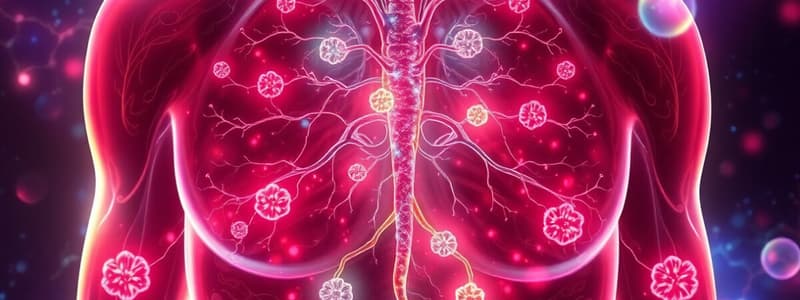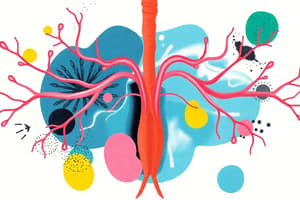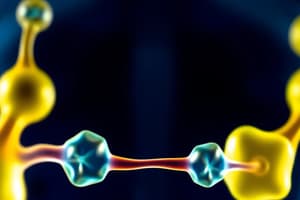Podcast
Questions and Answers
What is the primary function of the endocrine system?
What is the primary function of the endocrine system?
- To detoxify substances in the body
- To produce hormones that regulate metabolic activities (correct)
- To facilitate respiratory processes
- To control voluntary movements
Exocrine glands produce hormones.
Exocrine glands produce hormones.
False (B)
What are hormones?
What are hormones?
Chemical messengers that act upon target tissue.
The main organs of the endocrine system include the pituitary, thyroid, and ______.
The main organs of the endocrine system include the pituitary, thyroid, and ______.
Match the following hormones with their characteristics:
Match the following hormones with their characteristics:
How do water-soluble hormones typically exert their effects?
How do water-soluble hormones typically exert their effects?
Lipid-soluble hormones are impermeable to the plasma membrane.
Lipid-soluble hormones are impermeable to the plasma membrane.
What is a target tissue?
What is a target tissue?
Which stimulus is the most rare and quickest in hormone release?
Which stimulus is the most rare and quickest in hormone release?
The hypothalamus is responsible for controlling blood calcium levels through hormonal feedback systems.
The hypothalamus is responsible for controlling blood calcium levels through hormonal feedback systems.
What type of hormones are produced by the anterior pituitary gland?
What type of hormones are produced by the anterior pituitary gland?
Hormones are removed from the blood by _____, _____, and _____.
Hormones are removed from the blood by _____, _____, and _____.
Match the following hormones with their respective functions:
Match the following hormones with their respective functions:
What is the primary function of Antidiuretic Hormone (ADH)?
What is the primary function of Antidiuretic Hormone (ADH)?
Hypersecretion of growth hormone can cause gigantism.
Hypersecretion of growth hormone can cause gigantism.
What role does the infundibulum serve in the endocrine system?
What role does the infundibulum serve in the endocrine system?
The primary effect of the action of epinephrine is to support the _____ response.
The primary effect of the action of epinephrine is to support the _____ response.
Which of the following hormones stimulates the release of egg during the menstrual cycle?
Which of the following hormones stimulates the release of egg during the menstrual cycle?
What is the primary function of calcitonin?
What is the primary function of calcitonin?
Thyroxine (T4) helps to increase metabolic activity in most tissue cells.
Thyroxine (T4) helps to increase metabolic activity in most tissue cells.
What hormone is secreted by the adrenal cortex and acts as an anti-inflammatory?
What hormone is secreted by the adrenal cortex and acts as an anti-inflammatory?
The hormone glucagon is produced by the ______ cells of the pancreas.
The hormone glucagon is produced by the ______ cells of the pancreas.
Match the following hormones with their functions:
Match the following hormones with their functions:
What is the main consequence of hyperparathyroidism?
What is the main consequence of hyperparathyroidism?
Hypoparathyroidism leads to high blood calcium levels.
Hypoparathyroidism leads to high blood calcium levels.
What does the adrenal cortex glucocorticoids primarily stimulate?
What does the adrenal cortex glucocorticoids primarily stimulate?
During darker environments, the pineal gland produces more ______.
During darker environments, the pineal gland produces more ______.
Which type of diabetes is characterized by autoimmune destruction of beta cells?
Which type of diabetes is characterized by autoimmune destruction of beta cells?
Which condition is associated with the hypersecretion of aldosterone?
Which condition is associated with the hypersecretion of aldosterone?
Type 2 diabetes is primarily caused by an autoimmune response.
Type 2 diabetes is primarily caused by an autoimmune response.
What is the primary hormone produced by alpha cells?
What is the primary hormone produced by alpha cells?
Excessive thirst due to high urine output is known as ____________.
Excessive thirst due to high urine output is known as ____________.
What hormone is primarily responsible for stimulating muscle growth during puberty?
What hormone is primarily responsible for stimulating muscle growth during puberty?
A humoral stimulus involves direct neural signals to trigger hormone release.
A humoral stimulus involves direct neural signals to trigger hormone release.
What is glycosuria?
What is glycosuria?
Stress hormones like norepinephrine and epinephrine are produced by the ____________.
Stress hormones like norepinephrine and epinephrine are produced by the ____________.
What effect do environmental pollutants have on hormone function?
What effect do environmental pollutants have on hormone function?
Flashcards
Humoral Stimulus (CHEMICAL)
Humoral Stimulus (CHEMICAL)
The release of hormones is triggered by changes in blood levels of certain chemicals, like calcium.
Neural Stimulus
Neural Stimulus
Hormone release is initiated by the nervous system, typically through the autonomic nervous system (ANS).
Hormonal Stimulus
Hormonal Stimulus
The most common stimulus for hormone release, where one endocrine gland is stimulated by a hormone from another gland.
Nervous System Modulation
Nervous System Modulation
Signup and view all the flashcards
How are hormones removed from the blood?
How are hormones removed from the blood?
Signup and view all the flashcards
How quickly do hormones act?
How quickly do hormones act?
Signup and view all the flashcards
How long do hormones last?
How long do hormones last?
Signup and view all the flashcards
The Hypothalamus
The Hypothalamus
Signup and view all the flashcards
Hypophysis (Pituitary gland)
Hypophysis (Pituitary gland)
Signup and view all the flashcards
Anterior Pituitary
Anterior Pituitary
Signup and view all the flashcards
Calcitonin
Calcitonin
Signup and view all the flashcards
Parathyroid Hormone (PTH)
Parathyroid Hormone (PTH)
Signup and view all the flashcards
Thyroxine (T4)
Thyroxine (T4)
Signup and view all the flashcards
Aldosterone
Aldosterone
Signup and view all the flashcards
Cortisol
Cortisol
Signup and view all the flashcards
Melatonin
Melatonin
Signup and view all the flashcards
Glucagon
Glucagon
Signup and view all the flashcards
Hyperparathyroidism
Hyperparathyroidism
Signup and view all the flashcards
Hypoparathyroidism
Hypoparathyroidism
Signup and view all the flashcards
Cushing's Disease
Cushing's Disease
Signup and view all the flashcards
Insulin
Insulin
Signup and view all the flashcards
Type 1 Diabetes
Type 1 Diabetes
Signup and view all the flashcards
Type 2 Diabetes
Type 2 Diabetes
Signup and view all the flashcards
Glycosuria
Glycosuria
Signup and view all the flashcards
Polyuria
Polyuria
Signup and view all the flashcards
Polydipsia
Polydipsia
Signup and view all the flashcards
Polyphagia
Polyphagia
Signup and view all the flashcards
Pineal Gland
Pineal Gland
Signup and view all the flashcards
Thymus Gland
Thymus Gland
Signup and view all the flashcards
Endocrine System
Endocrine System
Signup and view all the flashcards
Endocrine Glands
Endocrine Glands
Signup and view all the flashcards
Hormones
Hormones
Signup and view all the flashcards
Target Tissue
Target Tissue
Signup and view all the flashcards
Water Soluble Hormones
Water Soluble Hormones
Signup and view all the flashcards
Lipid-Soluble Hormones
Lipid-Soluble Hormones
Signup and view all the flashcards
Second Messenger System
Second Messenger System
Signup and view all the flashcards
Direct Gene Activation
Direct Gene Activation
Signup and view all the flashcards
Study Notes
Endocrine System Overview
- The endocrine system is the body's second controlling system, influencing metabolic activities through hormones. It works with the nervous system to coordinate and integrate cellular activity.
- Endocrine glands produce hormones directly into the bloodstream; they lack ducts. Exocrine glands produce non-hormonal substances (e.g., saliva, sweat) via ducts that lead to the external environment.
Hormones
- Hormones are chemical messengers that act upon target tissues containing specific receptors. Most hormone action is regulated via negative feedback.
- Hormones can affect cell function in various ways, like increasing protein production, influencing cell division, or altering cell function. Hormones may also stimulate other glands to release their own hormones.
Hormone Types and Action
- Water-soluble hormones (most amino acid-based hormones except thyroid hormone) cannot directly enter cells; they bind to cell surface receptors, activating a second messenger system within the cell.
- Lipid-soluble hormones (steroid and thyroid hormones) can pass through the cell membrane and bind to intracellular receptors, directly activating genes.
Hormone Secretion Regulation
- Humoral stimuli: Hormone release is triggered by changes in blood levels of certain substances (e.g., blood calcium levels).
- Neural stimuli: The nervous system directly triggers hormone release (e.g., fight-or-flight response).
- Hormonal stimuli: Certain hormones stimulate the release of other hormones (e.g., hypothalamic hormones triggering anterior pituitary hormones).
- Nervous system modulation: The nervous system can override hormonal control under extreme stress.
Hormone Removal and Action Time
- Hormones are removed from the bloodstream by degradation enzymes, kidneys, and liver.
- Hormone action times vary greatly, from immediate responses to several hours.
- Hormone effects persist until blood levels decline.
Hypothalamus and Pituitary Gland
- The hypothalamus regulates the pituitary gland (hypophysis) via the infundibulum.
- The pituitary gland is often called the "master gland" due to its control over other endocrine glands.
Anterior Pituitary Hormones
- Growth Hormone (GH): Stimulates somatic growth; hyposecretion leads to dwarfism, hypersecretion to gigantism.
- Thyroid-stimulating hormone (TSH): Stimulates the thyroid gland, affecting metabolic rate.
- Adrenocorticotropic hormone (ACTH): Stimulates the adrenal cortex to produce cortisol, impacting stress responses.
- Follicle-stimulating hormone (FSH): Stimulates sperm and egg production.
- Luteinizing hormone (LH): Stimulates sex hormone release and egg release.
- Prolactin (PRL): Stimulates milk production in mammary glands.
Posterior Pituitary Hormones
- Oxytocin: Stimulates uterine contractions and milk ejection, associated with bonding.
- Antidiuretic hormone (ADH): Decreases urine output and increases water retention, impacting blood volume and pressure; inhibited by alcohol.
Thyroid Gland
- The thyroid gland regulates metabolism.
- Thyroxine (T4) and Triiodothyronine (T3): Increase metabolic activity; hyposecretion can cause cretinism or myxedema; hypersecretion causes Grave's disease.
- Calcitonin: Lowers blood calcium levels.
Parathyroid Glands
- Parathyroid Hormone (PTH): Raises blood calcium levels via actions on bones, kidneys, and intestines. Hyperparathyroidism leads to high calcium levels, while hypoparathyroidism causes low calcium levels (tetany).
Adrenal Glands
- Adrenal Cortex (Aldosterone): Regulates salt and water balance. Hypersecretion causes aldosteronism, affecting blood pressure and electrolytes.
- Adrenal Cortex (Glucocorticoids - Cortisol): Important in stress response, metabolism, and immune function. Hypersecretion causes Cushing's disease.
- Adrenal Cortex (Gonadocorticoids): Contribute to sex hormone levels.
Pancreas
- The pancreas has both exocrine and endocrine functions.
- Insulin (beta cells): Lowers blood glucose levels; hyposecretion leads to diabetes mellitus (type 1 often autoimmune).
- Glucagon (alpha cells): Raises blood glucose levels.
- Diabetes Mellitus: A group of metabolic disorders relating to high blood glucose levels.
Pineal Gland
- The pineal gland secretes melatonin, regulating the sleep-wake cycle.
Other Endocrine Glands
- Thymus gland: Plays a role in immune function.
- Gonads (testes and ovaries): Produce sex hormones (testosterone, estrogen, progesterone).
- Placenta: Secretes hormones vital during pregnancy.
- Adipose tissue: Secretes hormones that regulate appetite and energy expenditure.
- Heart: Secretes ANP to regulate blood pressure.
- Kidneys: Produce renin and erythropoietin.
Aging and Endocrine System
- Endocrine function typically declines with age. Changes in hormone levels can affect metabolism, growth, and other physiological processes.
Environmental Pollutants
- Environmental pollutants can disrupt hormone function, impacting various endocrine pathways.
Studying That Suits You
Use AI to generate personalized quizzes and flashcards to suit your learning preferences.




